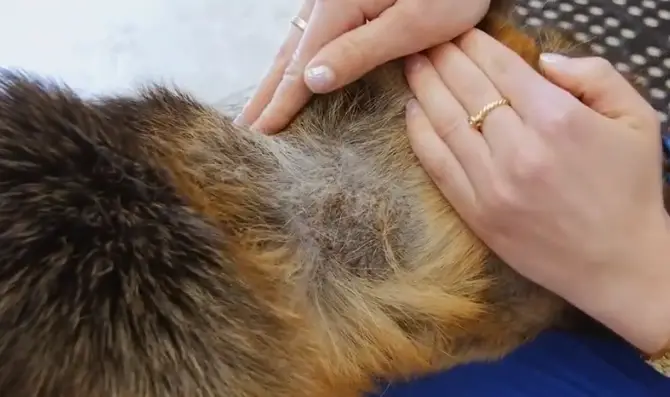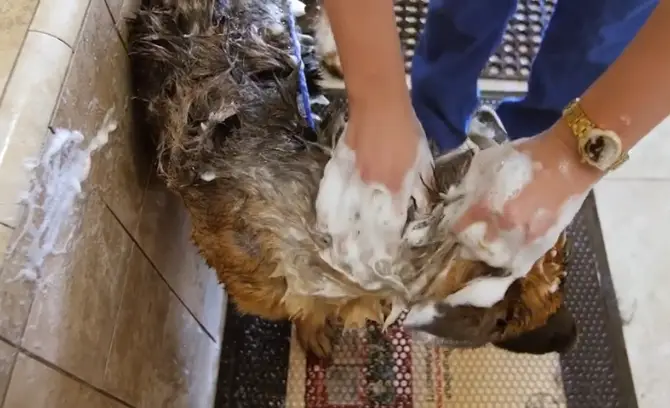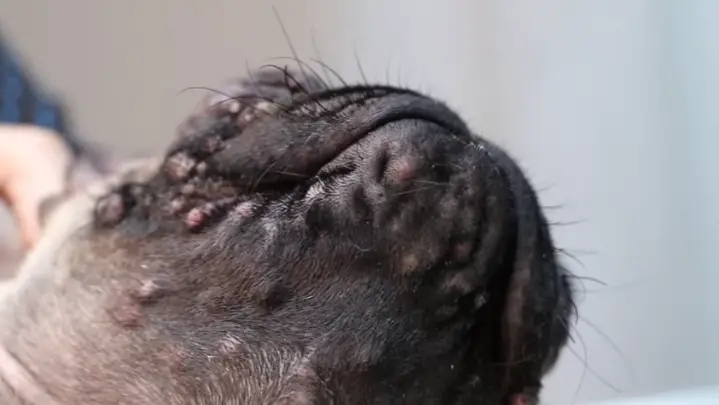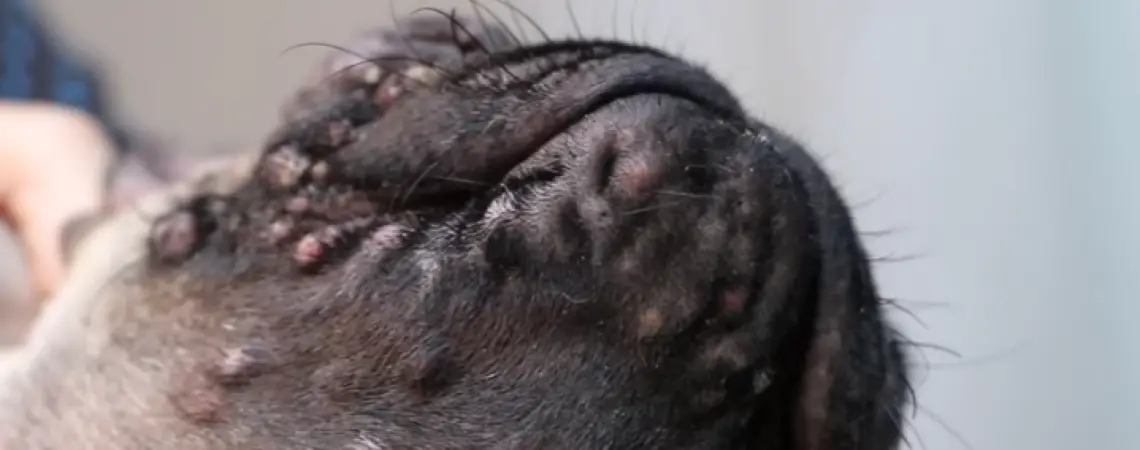The term folliculitis refers to the inflammation of the hair follicles. The most common explanation for folliculitis is a bacterial infection in dogs, so folliculitis usually refers to the inflammation of the hair follicles caused by infection from bacteria.
However, folliculitis in canines has additional causes as well, such as parasitic infestation, hormonal abnormalities, and fungal infections.
Systematic disorders (disorders affecting multiple body systems) or skin disorders may also cause folliculitis. If a dog suffers from a health disorder that impacts the function of the immune system, the bacteria that are normally located on the skin invade the hair follicle and contribute to inflammation and pain.

However, the most common cause of folliculitis in dogs is allergies. For example, an allergy to fleas could be the culprit, or responses to environmental allergens. Dogs who are sensitive to flea saliva and spend a lot of time itching and scratching may unintentionally exasperate their problem by introducing bacteria to these small abrasions caused by their claws.
Disorders which also lead to folliculitis include:
- Hypothyroidism (Reduced thyroid hormoe)
- Immune-mediated disorder
- Cushing’s Disease (increased steroid hormone)
- Callus Dermatitis
- Interdigital Cysts
- Canine Acne
- Fungal Infections
- Pyotraumatic Folliculitis
- Skinfold Pyoderma
- Idiopathic Furunculosis (Common in German Shepherds)
- Acral Lick Granuloma
- External Parasites
- Allergies
Symptoms of Folliculitis in dogs
Most dogs with folliculitis suffer from extreme swelling and itching. However, some pups may have other symptoms of illness as well, depending on the cause.
For example, a hormonal condition known as Cushing’s disease may cause folliculitis, and canines who experience the disease often show increased urination, increased consumption of water, and a pot belly appearance.
A list of the most frequent dog folliculitis symptoms includes:
- Superficial Erosions
- Draining Tracts
- Pimples
- Red swelling on the skin
- Hair loss
- Swelling
- Pain in affected areas
- Darkened skin
- Skin redness
- Crusting and scaling on the skin
- Itching
Treatments for Folliculitis in dogs
Generally, the treatment is straightforward once the root cause of the folliculitis is detected. The treatment for dog folliculitis differs according to the cause of the disease. Since bacteria make up the most common form of hair follicle infection, canine folliculitis treatment typically includes the use of antimicrobial agents.
In most cases, a topical (skin application) antimicrobial agent is used. However, your vet may also decide that injected or orally administered medication is best depending on the circumstances.

Bacterial skin infections can be challenging to treat because most antimicrobial drugs do not penetrate the skin and must be administered over a prolonged period of time and at high dosages. For this reason, it could take 3-12 weeks to actually be rid of the condition.
The efficiency of the treatment depends heavily on accurately detecting the cause of the bacteria and taking any underlying health issues into consideration. For this reason, self-diagnosis is not recommended, and a visit to your vet will be the best way to go.
When Demodex is suspected, sulfur limb dips or oral milbemycin, oxime (a widely used medication in preventive heartworms) is typically prescribed.
Dermatophytosis can be treated with antifungal shampoos or topical antifungal creams, and even orally administered medications. However, oral antifungal drugs are rarely used, because they can have undesirable side effects. You should only use soaps and shampoos specifically formulated for dogs or it can cause further skin irritation.
Pyoderma usually requires 4-6 weeks of oral antibiotics, and in some cases, steroids may be used to reduce itching and inflammation but, in mild cases, they are rarely required.
Local lesions can be treated with topical antibacterial agents. Ketoconazole, benzoyl peroxide, and Cholorhexadine based shampoos are especially useful for follicle flushing.
Are there any holistic treatments for folliculitis in dogs?
While I’d recommend that you visit your veterinarian in any case, there are a few holistic treatment options which can help to deal with some of the root causes of this ailment. These should be given in addition to seeking a qualified medical diagnosis of your dog’s condition from a veterinarian.
Dietary supplements
Omega-3 fatty acids are an essential anti-inflammatory agent. For a variety of conditions, probiotics can also be helpful. Many doctors conclude that allergies are related to poor intestinal health, but stress, genetics, poor diet, and even antibiotics can also cause intestinal woes for your dog.
Not only does this contribute to poor digestion, but it also creates an immune system risk, which can cause many other health issues over time. Supplements can aid digestion, reduce inflammation, and help to reduce or relieve many skin issues.
Herbs
There are a number of herbs which are anti-inflammatory and can assist your dog with swelling and pain in some cases. There are both orally administered and topical options which are easy to use.
- Nettles (anti-inflammatory)
- Chamomile (Relieves itchiness)
- Black or green tea (applied topically for itchy skin)
Witch Hazel can also be used as an astringent if you have it, but be careful when using it. This product contains alcohol, and it can cause the skin to become dry and painful if you use it on an area that is already red and irritated.
For dogs who already have very irritated or sore skin, aloe-vera is a safer choice. This product is all-natural, anti-bacterial, and very soothing ; that’s why it’s so popular for usage on severe sun exposure and burns.
Likewise, coconut oil is another great choice for irritated skin. It’s anti-fungal, anti-bacterial, soothing to the skin, and it’s readily available in most grocery stores to purchase.
Preventing folliculitis
Prevention seems very simple, as long as the underlying cause is recognized and reduced or eliminated. Keeping the skin dry and clean can avoid the production of baterial folliculitis in dogs with wrinkled skin such as pugs or Shar Peis.
If you suspect that an allergy may be the root cause of your issue, then you should set your sights on eliminating those allergy triggers. For example, folliculitis of the chin occurs in a specific form, and is often called ‘chin acne.’

Believe it or not, this type of folliculitis can occur because your dog is allergic to plastic and frequently comes into contact with toys or bowls that they are allergic to! Changing to glass or ceramic dishes, in this case, could solve the issues entirely.
In other cases, your dog could be allergic to something in their diet which is causing the folliculitus. If you believe that this is the case, then switching them to a limited ingredient diet which can help you to find and eliminate the allergen is likely your next step.
While fungi and mites can also be responsible, they typically don’t pose much of a risk unless your dog also has an immune system issue. In these situations, you can help to improve the natural defenses of your dog with a healthy diet, regular exercise, and reduced stress.





